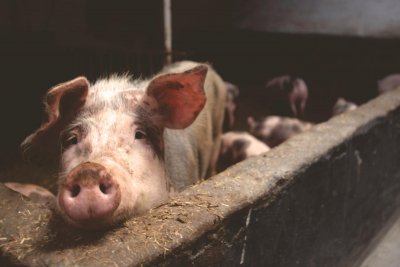Sustain • Brexit • Sustain Brexit newsletter
News update, February 2018
In a very busy period, let’s cut to the chase by highlighting three priority actions:
- Today’s launch of the Agriculture Bill consultation by Defra – please get involved. Vicki Hird will be coordinating the response from the Sustain alliance: vicki@sustainweb.org. The government's consultation document is published online; Sustain's initial comment is here.
- A reminder of Sustain’s own consultation on 10 Red Lines for Trade in Food - for environment, workers’ rights and fair trade, animal welfare, food standards, health and consumer protection – comments by 23rd March to: kath@sustainweb.org.
- Please re-tweet the trade-related food standards message and graphic pinned to www.twitter.com/Kath_Dalmeny
Meat, food safety, fish, sugar, antibiotics, international trade and agricultural labour availability have dominated Sustain’s Brexit Forum activities over the past month. Read on for the sometimes gory detail!
Kath Dalmeny
Chief Executive, Sustain: the alliance for better food and farming
www.sustainweb.org/brexit; @UKSustain
Updates on key policies and initiatives
UK Agriculture Bill
On Tuesday 27 February, Defra launched its consultation on ‘Health and Harmony - The future of farming, food and the environment in a green Brexit’. Read Sustain Farming Campaign Coordinator Vicki Hird’s initial responses – she will also be coordinating Sustain’s submission, so do get involved in shaping arguably the biggest shake-up to UK farming policy since 1947: vicki@sustainweb.org.
Disappointing news is that BEIS and Defra failed to extend the remit of the Groceries Code Adjudicator to protect farmers from unfair trading practices in the supply chain, offering instead a pitiful handful of measures to help some farmers. The Agriculture Bill will have to work a lot harder to convince us of the government’s long-term commitment to decent farm livelihoods.
If you haven’t read it yet, check out the blog by Sustain’s sustainable farming campaign coordinator: Can Michael Gove MP redefine productivity in farming?
Sustain submitted a response to the EFRA Committee Labour Constraints Inquiry, which closed on 26 February, reviewing the farm labour availability situation one year on from the committee’s previous call for evidence. We made the case for policies to make farm work more attractive, safe and rewarding; create opportunities for new entrants; and make the share of value fairer across the supply chain to enable better treatment of workers.
We were concerned to read the Climate Change Committee’s comments on the government’s 25 Year Environment Plan published in January, stating that in the CCC’s opinion a significant proportion of the success criteria are “vague”. For example, on: “ensuring that food is produced sustainably and profitably,” the CCC commented: “As written in the Plan, it is not possible to measure progress towards these objectives.”
UK Trade Bill
Take action on Trade in Food
Please read and comment on Sustain’s succinct 10 Red Lines for Trade in Food – we’d welcome your feedback to strengthen our case. Comments by 23rd March to: kath@sustainweb.org
Sustain has launched an e-action to support protection of good food standard in trade deals. Please circulate:
* Re-tweet the message and graphic pinned to www.twitter.com/Kath_Dalmen
* Or tweet: Let’s make sure Brexit means a Better Food Britain. Tell your MP to protect good food standards in trade deals: www.bit.ly/2HtnOak
Sustain has been super-busy over the past three weeks responding to stories about the meat industry. Not only are there problems with UK food safety standards and de-regulation, including many UK meat hygiene breaches with potential knock-on impact for British food producers, there are also concerns about food standards internationally, not least US meat safety, uncovered in a big Guardian investigation.
On trade in food, Sustain has been active in publishing comparative analysis of UK and US food poisoning, responding to the EFRA Committee Trade in Food report, as well as providing media comment on meat safety and country of origin labelling in the The Guardian and The Grocer and on ITN News. We also note that existing UK trade partners (via the UK’s membership of the EU) have signalled that they may seek Brexit concessions, for example with Chile saying they would seek concessions on agricultural produce as we leave.
New data from the Alliance to Save Our Antibiotics (led jointly by Compassion in World Farming, Soil Association and Sustain) revealed that animals raised for food in the US are dosed with five times the level of antibiotics as farm animals in the UK, with especially high levels in US beef production.
How disturbing then that several free-trade think-tanks (Initiative for Free Trade, Legatum Institute and Institute for Economic Affairs among them) chose to identify American beef as a ‘Brexit gain’ for the UK. The groups plan to work with free-trade think-tanks from the US to “hash out an ‘ideal’ US-UK free trade agreement” that would include Britain accepting US product standards.
Sustain has been active in championing a Race to the Top, with 10 red lines for trade in food. Worker, environmental, sustainable fisheries and animal welfare concerns were reflected in proposed amendments to the UK Trade Bill in the parliamentary debate on the bill at the end of January (see columns 136 to 138 of this transcript for more detail). The proposed amendments likely to be of interest to Sustain Brexit Forum readers were defeated. The date of the Report Stage is yet to be announced and – we hear – likely to be delayed.
We also set out the case against cheap food imports – arguing that cheap food has hidden costs and someone usually has to pay – the animals, the workers or the NHS. Sustain submitted evidence to the Trade Bill Committee in Parliament, arguing that cheap food imports are a risk to our health and to 3.9m jobs in the UK's food and farming industries.
Further, Sustain submitted a response to the EFRA Committee Trade in Sugar Post-Brexit Inquiry, which closed on 21 February. We combined concerns from Sustain members on health, environment and sustainable international development. A copy of the submission will be available on the EFRA website shortly.
Meanwhile, the European Commission has made it clear in a Notice to Stakeholders on the UK and EU Food Law that after 30 March 2019, the UK will become a ‘third country’ and that “subject to any transitional arrangement that may be contained in a possible withdrawal agreement, as of the withdrawal date, EU food law no longer applies to the UK,” The document advises food businesses and regulators to assess the need for possible changes to labelling, authorisations and border controls. The EC analysis contains more detail than anything we’ve yet seen from the UK government!
A useful primer called ‘Back to Basics’ on trade agreements has been published by a group of trade policy experts, including the Trade Justice Network and Sustain member Global Justice Now.
UK Fisheries Bill
We have seen neither fin nor scale of the Fisheries Bill, simply indications that it will now come after the Agriculture Bill, and rumours that it might be close to Easter. Sustain is increasingly concerned about what this slippage means for sustainable fishing. We are calling for the UK to continue sharing stock data with the EU and to fish within Maximum Sustainable Yield (MSY). We want the Government to maintain the discard ban, the ban on bottom trawling and keep regulations on fish labelling, as well as maintaining or increasing funding for sustainable fishing. We want to see a commitment to more support for the small-scale UK fleet and more support for domestic fishers to get sustainability certification. The government can also use its massive buying power to support sustainable fishing in public sector food contracts.
Sustain laid out what we would like to see in response to the Labour Party’s fishing consultation.
EU Withdrawal Bill (Repeal Bill)
The House of Lords Committee Stage for the EU Withdrawal Bill started on Wednesday (February 21) and is scheduled to go on until March 26. There are now 80 pages of amendments – worth a search of this mammoth and gloriously pedantic document for your issue of choice, if only to get a glimpse of quite how much is at stake.
Media coverage has understandably focused on constitutional issues, EU citizens’ rights, the devolved administrations and questions over the Irish border. However, the proposed amendments cover much more that is relevant to the Sustain Brexit Forum, for example:
- Retention or loss of the Charter of Fundamental Rights.
- The UK’s continued engagement or otherwise with important European agencies and services, such as the European Chemicals Agency and the European Food Safety Authority.
- The status of EU directives adopted, but not implemented, before exit day.
- The retention or loss of environmental standards and protections, including maintenance of environmental principles such as: the precautionary principle, principle of preventive action, rectification of environmental damage at source, the polluter pays principle, access to justice, and integration of environmental principles into policies and activities.
- The future treatment of EU retained law in the UK, especially with regards, for example:
- employment entitlements, rights and protection;
- equality entitlements, rights and protection;
- health and safety entitlements, rights and protection;
- consumer standards;
- human rights protection;
- animal sentience and animal welfare;
- rights of the child.
Food, Farming and Countryside Commission
The Commission’s research, consultation and deliberations continue. In February, the RSA hosted the first in a series of themed debates prompted by the RSA’s new Food, Farming and Countryside Commission, with an expert provocation from Patrick Holden of the Sustainable Food Trust. He and a lively audience grappled with questions about the price and hidden costs of food; and how the food system could be fairer to everyone – producers, retailers, consumers, the environment and future generations. Read the write-up of this True Cost of Food event on the RSA’s Food, Farming and Countryside Commission website.
Oxford Real Farming Conference
In addition to the January 2018 Oxford Real Farming Conference’s audio archive, the organisers have now made available online four one-hour videos – which include a Q&A session with Michael Gove; and a session with Sustain’s chief executive Kath Dalmeny sharing insights on the Brexit State of Play. See also Sustain’s ORFC 2018 write-up.
Other Brexit-related news from the last month
Food and farming groups condemn Government response to unfair trading practices as ‘utterly weak’
The Government has today failed to protect British and overseas farmers from unfair trading practices by refusing to extend the remit of the Groceries Code Adjudicator to include primary producers.
Food and Farming Policy
Sustain response to Michael Gove Speech at National Farmers Union Conference
Defra Secretary of State Michael Gove outlined his new approach to farm policy at the NFU Conference in February. Vicki Hird, Sustainable Farming Coordinator at Sustain, commented.
Food and Farming Policy
National Farmers' Union publishes Brexit vision statements
The National Farmers' Union highlights the forthcoming UK Agriculture Bill as "a golden opportunity to build a system that works for British farmers". The NFU has published a range of vision statements to deliver these messages to politicians and the public, seeking to "build consensus for a vision of a thriving farming sector post-Brexit and beyond".
Brexit
Third-sector groups publish Brexit animal welfare analysis
Over 40 organisations have backed a detailed analysis of post-Brexit animal welfare opportunities, including Sustain observer Wildlife & Countryside Link in collaboration with the UK Centre for Animal Law (A-Law).
Food and Farming Policy
Sustain responds to Labour Party animal welfare proposals
Sustain's chief executive Kath Dalmeny welcomes Labour's proposals for a raft of new animal welfare measures, published in The Guardian newspaper.
Food and Farming Policy
Sustain responds to the Labour party's fishing policy consultation
During December 2017 and January 2018, the UK Labour Party consulted on their policies for coastal communities, in particular fishing and the fishing industry. Read Sustain’s response to this consultation.
Sustainable Fish Cities
Greener UK risk tracker paints worrying environment picture
Members of the Greener UK alliance have expressed "serious concerns" that UK environmental protections will be reduced after Brexit, despite the Government's promises to put the environment into a better state for the next generation.
Brexit
UK free-trade think tank says American beef is a Brexit ‘gain’
An influential UK free-trade think tank has identified eating American beef as a ‘gain’ for British consumers from post-Brexit trade deals, whilst claiming food safety and health concerns about US food standards are ‘myths’.
Brexit
UK food producers witness rise in exports as a Brexit ‘bonus’
Government figures show UK food and drink businesses are now selling products to 217 countries, with total exports now worth double what they were a decade ago. Beer, gin, milk, cream, cheese, chocolate, salmon, pork and whisky are among the products driving the increase over the past year.
Brexit
Food trade associations call for pro-UK food industry Brexit deal
UK trade associations including the Food & Drink Federation, British Retail Consortium and National Farmers’ Union have called for frictionless trade, seasonal workers, food production to be supported by agriculture policy and ‘efficient and proportionate’ regulation.
Brexit
Loss of abattoirs could mean end of locally sourced meat
The UK’s network of small local abattoirs is near collapse. Without urgent action, the marketing of locally-produced, traceable meat will no longer be possible in many parts of the country, according to a new report from the Sustainable Food Trust
Food and farming policy
Parliamentary committee tells government: don’t sacrifice high food standards for trade deals
A parliamentary committee has told the government’s Brexit and trade negotiators that they must not sacrifice Britain’s high food standards in order to secure trade deals.
Brexit
Alliance to Save Our Antibiotics reveal huge levels of antibiotics in US farming
New data revealed by the Alliance to Save Our Antibiotics (led jointly by Compassion in World Farming, Soil Association and Sustain) has revealed that livestock raised for food in the US are dosed with five times as much antibiotic medicine as farm animals in the UK.
Commentator George Monbiot also wrote a powerful article about the likely threat to antibiotics in human medicine from a future US trade deal that encourages profligate use of farm antibiotics.
Brexit
Sustain sets out the case against cheap food imports
Sustain submitted evidence to the Trade Bill Committee in Parliament, arguing that cheap food imports are a risk to our health and to 3.9m jobs in the UK's food and farming industries.
Brexit
Sustain responds to Andrew Percy MP's comments backing US chlorine chicken
The Farmer's Guardian posted a story in which Andrew Percy MP was quoted as saying comments against American chlorinated chicken feed 'anti-American bigotry'.
Sustain
Sustainable development doyen Jonathon Porritt slams Michael Gove’s promises
Jonathon Porritt has published an excoriating blog describing Secretary of State for Defra Michael Gove’s speeches and environmental promises as ‘bland platitudes’.
Brexit: We stand at a cross-roads. When the UK leaves the European Union, will our leaders uphold good standards for our food, farming, fishing and trade deals? And will they agree a sensible deal with the EU? We need to make sure that they do!



